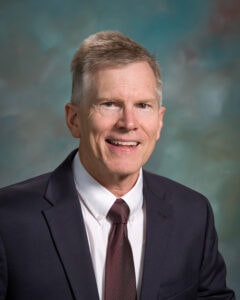Over the past 18 months, my colleagues and I have written over 70 articles in this newspaper to help inform our community about the Covid pandemic. Today, given the impact of the current surge of the Delta variant, I am pleading for your help.
In late July, the highly infectious Covid-19 Delta variant became the dominant strain in Idaho. This Delta variant is much more contagious, causes more severe disease and has a larger impact on our younger population compared to the strain we have seen thus far. The healthcare impact of this regionally and locally has been grim.
In just a few weeks with the Delta strain, Covid hospitalizations throughout the region have skyrocketed to exceed the high points seen previously in the pandemic. Regional healthcare systems have hit saturation and have almost zero capacity to take critically ill transfers – whether they be Covid cases or other medical or surgical emergencies like a heart attack or an emergency surgery. Essential supplies such as ventilators, BIPAP machines, drugs to treat Covid and even, at times, oxygen, are extremely limited.
More importantly, our local hospital staff, who are your friends, family and neighbors, have been working at high capacity now for 18 months and now are hitting the limits of physical and emotional exhaustion. In recent days, CVH staff worked to transfer a critically ill patient. After many calls to hospitals throughout Idaho, Montana, Oregon and Washington we learned that there are no available ICU beds. This extends as far east as Billings, north to Kalispell, Coeur d’Alene and Spokane, west to Seattle and Portland, and beyond Boise to the south. This has never happened before. Make no mistake, this is a very dangerous situation for all of us. We can only regain control of the situation for our community through your help as an individual.
For over 28 years, I have served our community as a physician. It has been an honor to care for people who consistently rally to help those in need. Now, the current situation puts all of us in such a moment. We will succeed or fail together.
To succeed, we need the immediate engagement of all of us to slow the spread of this new variant. The ask of us is truly easy: wear a mask when around others, avoid big gatherings, stay home and away from others if you feel sick and wash your hands. These are just inconveniences and should not be represented as soul-squashing tasks. We also need to reduce the vulnerability of people in our community by increasing Covid vaccinations locally. Clearwater Valley Health has a supply of Covid vaccines. You can call to schedule to receive one now.
Fall also brings additional risk during this Covid surge as our children return to school. For my 28 years in this community, we have consistently seen a wave of respiratory infections driven by the start of school. This is not limited just to children, as parents, grandparents and other community members also become secondarily infected. Although the original form of Covid largely spared children, the Delta variant does not. One of every seven infections occur in children. With the decision this past week of our local school board to not implement universal masking, we will almost certainly see the usual pattern of infections. This year, however, the Covid Delta variant will be able to accelerate its spread in a community already bumping against the limits of its healthcare resources.
If left unchecked, the result of this decision will be disastrous.
You can help avert disaster by encouraging your children and grandchildren to wear masks and follow the guidelines outlined above. Although wearing a mask may be viewed by some as an inconvenience, modeling and engaging in safe behavior is an opportunity to teach our youth a valuable lesson about empathy and compassion for the greater good at this critical time.
If we cannot encourage our children to take simple steps to protect their families and community, this demonstrates to them that in life, they should not experience any minor personal inconvenience – even when the safety of our community and function of our healthcare infrastructure hangs in the balance.
Long after this pandemic has passed and lives only in our memories and history books, how we each acted, the example we provided for our youth, and how we rallied as a community for the benefit of others, will reveal who we really are.

